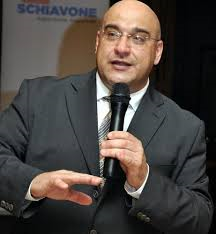Nationalist MP Hermann Schiavone says he will not give up his seat to Adrian Delia
In a telephone conversation this morning, Nationalist MP Hermann Schiavone has denied that he will give up his seat in parliament to Adrian Delia, who he is backing openly in the party leadership contest, should Dr Delia be elected. The rumours, already swirling at the time, intensified after this website published a photograph showing Dr Delia and Mr Schiavone sitting at a table at a Valletta café with former Nationalist cabinet minister Michael Falzon, who had been found to have kept hidden almost half a million euros in a bank account in Switzerland even while he was in the cabinet of government, and Edward Gatt, who is legal counsel to the Prime Minister’s chief of staff, Keith Schembri, in the money-laundering inquiries currently being conducted by magistrates.
Mr Schiavone told this website: “Yes, I am backing Adrian Delia but I will not give him my seat in parliament. Even if I wanted to, I couldn’t do it because I wasn’t elected in a casual election. This means that a casual election will kick in if I resign my seat. The party might be able to secure the agreement of the other candidates (who were on the ballot sheet), to not submit their nominations. But there is a candidate from the PD there too.” Candidates from the PD officially and at law stood for election as Nationalist Party candidates, but are now insisting on their autonomy.
Describing the incident pictured in the published photograph, Mr Schiavone said: “Adrian and I were at Café Cordina with Michael Falzon, having stopped for a break. Edward Gatt walked past and Adrian called him to come and join us. We just had a light chat and a coffee, that was all. Nothing serious was discussed.”
Three of the four leadership contenders are unable to become Opposition leader, should they be elected to the party leadership, because they do not have a seat in parliament. To become Opposition leader, they will have to persuade a Nationalist MP to give up his or her seat to them.
The situation is made more difficult by the fact that when a member of parliament resigns his or her seat, the law kicks in automatically for a casual election to fill that seat. All the candidates from that party who were on the original district ballot sheet in the general election are then eligible for election, but they must submit their nominations as their inclusion is not automatic.
This means that it is not enough for the leadership contenders who don’t have a seat in parliament to strike a deal with somebody who has a seat. They must also secure the agreement of all the others who were on the ballot sheet, that they will not submit their nominations for a casual election.
This means that any such agreement is most likely to be struck with a member of parliament who got his or her seat through a casual election following the general election. Casual elections are the process by which seats are filled when they are vacated by members of parliament who were elected twice over, in two separate constituencies. When a member of parliament resigns a seat that he or she acquired through a casual election, another casual election does not follow. The seat is filled through co-option – in other words, somebody already selected by the party bosses is given the seat.
The roles of party leader and Opposition leader are separate and distinct. The party leader leads the party, but the Opposition leader leads the Opposition, which means the MPs in parliament who do not pertain to, or are allied with, the government. The Opposition is a parliamentary construct and therefore the Opposition leader has to be in parliament.
It just so happens that in the Maltese system, like the British system (the Westminster model, essentially a two-party system which sometimes allows for a third party), the leader of the winning party automatically becomes the Prime Minister while the leader of the losing party automatically becomes the Opposition leader.
The system does not foresee or allow for situations in which a major political party elects a leader who does not have a seat in parliament. It assumes that anybody who reaches the stage where he can lead the party will have a seat in parliament.
The role of party leader is not a constitutional role. The role of Opposition leader is one of the great Constitutional roles. The Opposition leader is sworn in by a formal oath of office in a state ceremony. This cannot happen unless he or she has a seat in parliament.
This website has now sent the following questions to Dr Delia’s campaign aide for the press, who responded immediately saying that he will get back with the replies as soon as possible.
Good morning, Mr Bonello. Has any Nationalist member of parliament agreed to give up his or her seat to Dr Delia should he be elected party leader, making it possible for him to become Opposition leader?
Does Dr Delia have a formal or informal agreement in this regard? If there is any such agreement, was the MP in question elected outright or in a casual election?
If there is no agreement with a member of parliament, how does Dr Delia plan to tackle this situation if he is elected?

Hermann Schiavone, who was elected to parliament for the first time last June, says he is backing Adrian Delia openly but will not give up his seat in parliament to him. Without a seat in parliament, the party leader cannot take the oath of Constitutional office as leader of the Opposition (or, for that matter, Prime Minister).
